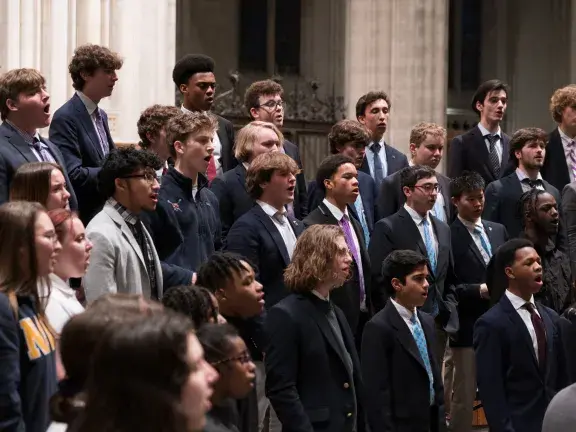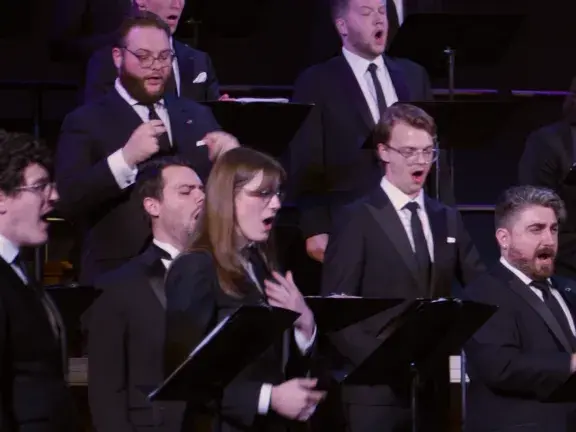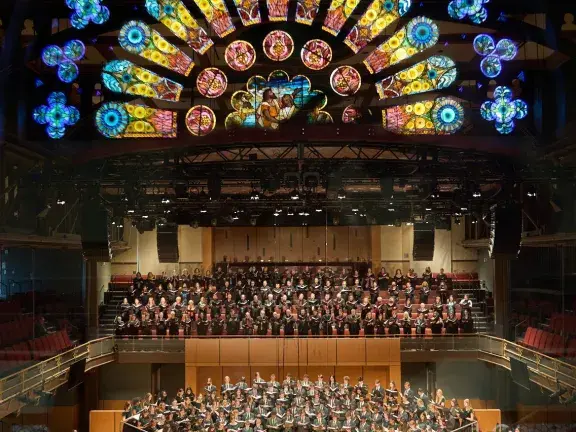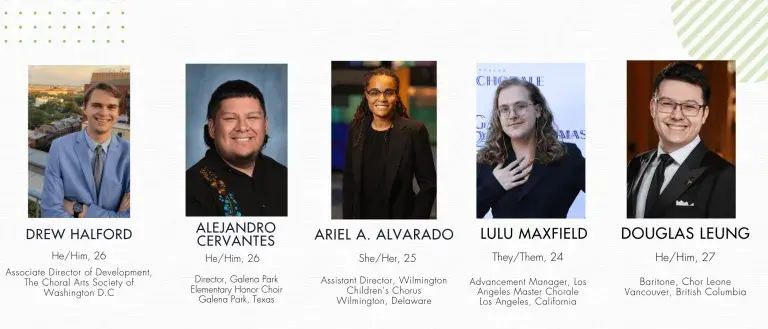
Register by October 17 to Secure Your Spot!
| Registration Type | Member Price |
|---|---|
| Early Bird Registration (Sept. 11-Oct.3) | $750 |
| General Registration (Oct. 4-Oct.17) | $850 |
| Registration Type | Member Price |
|---|---|
| Early Bird Registration (Sept. 11-Oct.3) | $750 |
| General Registration (Oct. 4-Oct.17) | $850 |
| Registration Type | Member Price | Non-Member Price |
|---|---|---|
| Early Bird Registration (Sept. 11-Oct. 3) | $750 | $850 |
| General Registration (Oct. 4-Oct.17) | $850 | $950 |
Not a member? We'd love to have you join us for this event and become part of the Chorus America community! Visit our membership page to learn more, and feel free to contact us with any questions at membership@chorusamerica.org.
| Registration Type | Non-Member Price |
|---|---|
| Early Bird Registration (Sept. 11-Oct. 3) | $850 |
| General Registration (Oct. 4-Oct.17) | $950 |
Think you should be logged in to a member account? Make sure the email address you used to login is the same as what appears on your membership information. Have questions? Email us at membership@chorusamerica.org.
| Registration Type | Price |
|---|---|
| Individual Session | $30 each |
| All Four (4) Sessions | $110 |
*Replays with captioning will remain available for registrants to watch until November 1, 11:59pm EDT.
Member Professional Development Days are specially designed for Chorus America members. If you're not currently a member, we'd love to welcome you to this event, and into the Chorus America community! Visit our membership page to learn more about becoming a member of Chorus America, and please don't hesitate to reach out to us with any questions at membership@chorusamerica.org.
| Registration Type | Price |
|---|---|
| Individual Session | $30 each |
| All Four (4) Sessions | $110 |
*Replays with captioning will remain available for registrants to watch until November 1, 11:59pm EDT.
| Registration Type | Price |
|---|---|
| Individual Session | $30 each |
| All Four (4) Sessions | $110 |
*Replays with captioning will remain available for registrants to watch until November 1, 11:59pm EDT.
Member Professional Development Days are specially designed for Chorus America members. If you're not currently a member, we'd love to welcome you to this event, and into the Chorus America community! Visit our membership page to learn more about becoming a member of Chorus America, and please don't hesitate to reach out to us with any questions at membership@chorusamerica.org.
How Choruses Already Align-and Can Engage More-with Gen Z

When it comes to the ways choral music has shifted in recent years, the influence of Generation Z (Gen Z) is a hot topic. Choruses need to think outside the box when marketing to Gen Z audience members, singers, and donors, especially because those born between 1997 and 2012 now make up one in five Americans. But many choruses struggle to resonate with a generation whose influence is steadily growing.
Since the November 2000 election, 8.3 million Gen Z members turned 18, which makes their voice in politics increasingly powerful. Gen Z is also more racially and ethnically diverse than older generations according to the Pew Research Center. In 2015, when many Gen Z members reached college age, 50 percent of adults ages 18 to 24 were enrolled in or had already finished their undergraduate degree.
At the Cathedral Choral Society, we’ve seen an uptick in auditions from Gen Z members, leading to a shift in the makeup of the chorus. We’re also seeing increases in Gen Z members becoming part of our audiences.
As someone born in 1999, I often find myself defending my Gen Z title while joking at my own expense in humorous office lunchtime debates. But important questions lurk in the context of these conversations. What would it mean to think differently about whether or not choral music is reaching our diverse, highly educated, and politically outspoken generation? Does the act of singing in a chorus align more with Gen Z’s values than we realize? If so, how can we as choral singers, conductors, and administrators bring even more of Gen Z into the choral landscape so many Americans call home?
Drew Halford (he/him): There's a perception that it's a very tough time to be someone in Gen Z. I think for some things that's true. When you're competing for jobs or opportunities, I think it's challenging just because of the difference of experience. The world we live in now is different, in some ways for the better, and in many ways for the worse.
Alejandro Cervantes (he/him): What's lost on [other generations] is that our interconnectivity is a tool. We can see what's going on around the world, we can talk to people from different parts of the world, we can connect with people better, and we can discover new ideas, and I think that's lost on them.
Ariel Alvarado (she/her): We're not afraid of hard work and cutting our teeth and making it happen. We just want what is real and authentic. I've been really fortunate in my musical community that I have only encountered authentic people who care about people and care about the music.

Ariel: Our generation values authenticity. I think it comes from a place of the rug being pulled out from under us societally so many times. Sometimes that can be bad, but ultimately it comes from a place of “I don't really care about the artifice. I just want to know who you are and how you made it happen.”
Lulu Maxfield (they/them): Community, and particularly finding adult connections. Finding people who you have a common connection with, whether it's singing or something else, is the way we are going to continue to make friends and find community. Many singers in the chorus have joined as they are finding themselves in their trans identity, and most are specifically looking for other people who can relate. The combined love of singing and the shared experience is why I think so many of us in that chorus are close outside of the singing group.
Douglas Leung (he/him): There is a bigger emphasis on mental health and on social justice. We care about when something feels right, both internally and with other bodies or organizations. There's a big sense of justice or virtue or what is right. I think a lot of Gen Z also struggles with what is right, given the way the world is right now, but I do think that it’s one of the things we care about the most.
Douglas: It's kind of everything for me. There was a moment when I was in 10th grade and I had had a huge fight with my mom right before a concert; it was awful. I remember performing that set and feeling connected with everyone around me, and then I talked with my mom afterwards because she did wind up going to see the show. That was the moment where we healed and it all fixed itself. Ever since that point, chorus has been the thing that makes me feel connected with other people; it makes me feel emotionally capable of being a human being, and I can listen to other people better.
Lulu: I liked to sing, but it wasn't until college offered me the opportunity of a social group through singing that I joined. I fell in love with it my first rehearsal. I walked into my first rehearsal ever, and just in the warmups I felt this warmth of the sound that made me tear up that day. I've been chasing that feeling ever since.
Alejandro: The reason I continued with choral music in college was because I had an awesome director in my sophomore year of high school. She made us all feel seen, and she was interested in us. In rehearsal she was very structured and direct, but we had that trust in her. That community and that feeling of belonging was really important.

Ariel: I have a few positions outside of Wilmington Children’s Chorus, so every day looks a little bit different. I think that's a part of being a member of Gen Z—I've learned how to walk in a variety of spaces and in a variety of worlds. I spend a couple of hours every morning in meetings with Elevate Vocal Arts. A part of my work with them is school residencies, so I'll go into a school from 9 a.m. to 1 p.m., then I go to a rehearsal in the evening for either Mendelssohn Chorus of Philadelphia or Wilmington Children’s Chorus. So you kind of have to piece together the work. That's a part of being a young gigging musician anywhere, but I think the adaptability that I have learned is a product of the generation that I grew up in.
Drew: I'm the only Gen Z staff member at the moment. I think it brings different opportunities and it makes you think about things in a different way. In Development, we have been stressing the notion that every gift matters regardless of the size. A lot of that is targeted towards Gen Z and other younger generations—we have less money to give since we have not been working as long. But all of the data shows that Gen Z is just as generous as previous generations, and in some cases even more so. It's just finding the right message and finding the right ask, because Gen Z does have a desire to give. We want to make sure our voice is heard and that we are seen within the philanthropic community.
Alejandro: When I lead my elementary school choirs, I know they need constant engagement. My Gen Alpha kids kind of get the same bad rap as Gen Z, but if they're interested, they're going to pay attention. They also have to see that I really enjoy it. I kind of treat my classes like a stand-up routine. I see new sets of kids every day, but they all get the same lesson, so it's kind of like every day I'm in a different city with a different crowd!
Lulu: My work is predominantly with the Los Angeles Master Chorale, which is a very old organization with a longstanding history. What I see with an older organization is that connection with Gen Z is a struggle more generally before even looking at racial demographics. Just connection with Gen Z is a frequent topic in our staff meetings. It's something that our marketing department focuses on. How are we going to reach people that are underrepresented broadly in classical music audiences? This is true of both young people and people of the global majority, and so looking at the vast intersection of the two groups can serve as an access point.
Ariel: In a lot of ways, I'm not sure that the progress that has been made in terms of being more racially and ethnically inclusive have much to do at all with the fact that Gen Z is more diverse. I think that we're just behind the curve of recognizing different people groups [in the choral community], so now people are being hyperconscious of being inclusive. As an Afro-Latiné, I see my Latiné side and my Black side [represented], but I don’t see much crossover yet. And that's to come. The wheel of progress moves very slow. We're doing our best to address all of those issues [and be more inclusive]. Wilmington is a predominantly Black city, and the Children's Chorus has been very intentional in making sure that our programming, staff, and everything that we do is a reflection of our city. But even then I think there's work to be done, and I think it doesn't have much to do with the fact that Gen Z is more multiracial.

Drew: Be flexible and be genuine. Be flexible, whether that's during auditions and trying to meet people where they are, and be genuine, whether you want to recruit singers or get them to be a supporter in any way. Gen Z really listens to that, and they can see through when things are [or aren't] genuine.
Douglas: It’s very hard to attract people into a hobby when they're in their mid-twenties. A lot of the time, people get into singing when they are in high school. Once that switch gets clicked in your brain, it's an itch that you know you need to go back to chorus and scratch, and COVID-19 kind of killed that opportunity. Keep building up and focus the energy on the youth of today. If you have good people, and you make a good organization, Gen Z will come to you.
Ariel: If you strip away the artifice of what generation you're from, your socioeconomic status, and all of that stuff, people have a lot more similarities than differences. The more we have these conversations, the easier that is for us to realize. In the same way that we talk about ADEI work, you don't have to have all the answers. You just need to start today with one thing. The wider that we cast the net as a choral community, the more fish we’re going to catch. Start today, start small, and start with something.
Alejandro: You can always go back and sing a Mozart piece or a Bach piece, but there are plenty of composers who are around today (and plenty of composers who were around in the past) who maybe didn't have the platform as much as all the old greats. So find out what's in the pulse of society right now. If you're not already around Gen Z, see if you can see what it looks like! If you're interested in building a community choir, you can find colleges and ask to come in and observe so you can see what choirs there look like. Just talk to us, do the research, and learn about what it is that motivates us.
Lulu: You have to give Gen Z something of value that's not just the music. The music is undisputedly valuable, but what are we going to give to Gen Z besides just playing them the Spotify album of our ensemble? What community are we forming? What growth opportunities are we giving to our singers? They have to find unique value in the live experience. I want my peers and younger Gen Z members to see the beautiful impact that live choral performance has on my life so that they might find access to that impact themselves.
In my conversations with these vibrant members of Gen Z, I was struck by how often community was mentioned. Every interviewee expressed that community was vital in their experience of choral music. Singing with others seems like it would inherently build community, but for Gen Z, that might not be enough on its own. Singing in front of others is a vulnerable activity, and being vulnerable requires trust. So what can choruses do to unlock that level of trust and openness?
It’s not enough to simply be a part of a group; that belonging must come from a place that’s real and genuine. This can look like a number of things, because that’s the point. Every chorus is different. Lean into the uniqueness of your mission, that annual concert your audience loves, or the ways your singers bond outside of rehearsals. Or, if you can, all of the above!
Looking up statistics and reading articles like this one is a great start, but what actually resonates with Gen Z communities near you? Are there young adults attending your concerts who might have valuable insight? Ask them about their perspective over coffee. If a member of Gen Z has recently given a donation, can you send them a thank you text and ask them what motivated them to give? This qualitative data can help inform your next steps.
The world feels heavy right now, and Gen Z is experiencing a lot of turbulence as a result. Embracing discussions during rehearsal breaks or after concerts where “real life” comes up might allow Gen Z singers to bond more with those not in their generation. In time, this openness can lead to a vibrant choral culture—one where every singer can enter the room with a brighter smile and a deeper trust in the singers next to them. Chorus has a way of making us feel more human. We can listen and process our emotions better in the presence of music. It’s what we do after that—the authenticity we lead with, the trust that we build, and the questions we ask our community members—that can make choral music a truly welcoming space, especially for Generation Z.

Erin Haar is the Creative Media & Marketing Manager for the Cathedral Choral Society (CCS), the symphonic chorus in residence at Washington National Cathedral in DC. She is also a writer, photographer, and video producer, and her work has been featured by The Washington Post, The Daily Californian, DC Theater Arts, and Fujifilm. Her passion for multimedia storytelling has no limits—in addition to her work with CCS, she also serves on the board of Oral History in the Mid-Atlantic Region (OHMAR) as their Communications Director